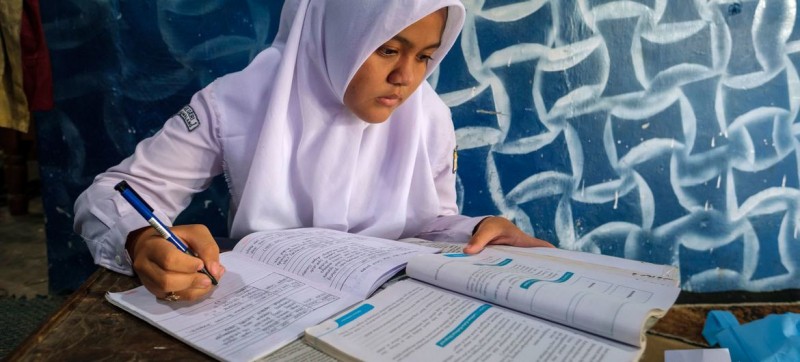Contents
A 14-year-old girl works on a school assignment at home in the Central Java Province of Indonesia. Solving the equation: Helping girls and boys learn mathematics, a new report published on Wednesday by UN Children’s Fund UNICEF, has revealed a growing worldwide disparity in maths skills between girls and boys. The report raises the alarm on how issues of sexism and gender stereotypes have undercut the potential of girls in the classroom. The report features new data analyses covering more than 100 countries and territories, which reveal in headline terms, that boys are up to 1.3 times likely to get the maths skills they need, compared to girls.False expectations
Negative gender norms and stereotypes often held by teachers, parents, and peers regarding girls’ innate inability to understand mathematics, are contributing to this disparity.
These stereotypes are projected onto young girls and often undermine their self-confidence, setting them up for failure, UNICEF says.
The report further recognizes the long-term effects of sustained gender disparities, specifically noting how boys are more likely to step up and apply for jobs in mathematics. The finding represents a stark gender gap, depriving the entire world of talent in the science, technology, engineering and mathematics (STEM) fields.
Opportunity fails to knock
“Girls have an equal ability to learn mathematics as boys – what they lack is an equal opportunity to acquire these critical skills,” said UNICEF Executive Director Catherine Russell.
“We need to dispel the gender stereotypes and norms that hold girls back – and do more to help every child learn the foundational skills they need to succeed in school and in life.”
Learning maths at a young age strengthens memory, comprehension, and analysis, in turn improving children’s ability to create, the report notes.
Ahead of next week’s crucial Transforming Education Summit, UNICEF warns that children who do not master basic maths and other foundational learning, may struggle to perform critical tasks in the future.

11-year-old Anish studies at home in Gujarat, India, as schools are closed due to the COVID-19 pandemic in 2020.
Figures tell the story
An analysis of data from 34 low and middle-income countries featured in the report, shows that while girls lag behind boys, three-quarters of schoolchildren in grade 4 elementary classes, are not obtaining foundational numeracy skills.
Data from 79 middle and high-income countries show more than a third of 15-year-olds have yet to achieve minimum proficiency in mathematics. These statistics reveal the depth of educational issues plaguing all genders.
Household wealth is also a determining factor. The report notes that schoolchildren from the richest households have 1.8 times the odds of acquiring numeracy skills by the time they reach fourth grade, than children from the poorest households.
Children who attend early childhood education and care programmes have up to 2.8 times the odds of achieving minimum proficiency in mathematics by the age of 15 than those who do not.
COVID millstone
The report further also notes the impact the COVID-19 pandemic has had on further entrenching gender disparities.
Similarly, mass disruptions to education systems worldwide have delayed progress for all students. In countries where girls are more likely to be out of school than boys, the overall disparities in mathematics proficiency have been growing since the COVID-19 pandemic.

Students sit outside of E Alfonso Ugarte school in San Rafael Shipibo community in the Masisea district of Peru due to classes being suspended during the COVID-19 pandemic.
Turning the page
UNICEF is calling on governments to commit to reaching all children with quality education, and arguing for renewed effort and investment to re-enroll and retain all children in school; increase access to remedial and catchup learning; support teachers and give them the tools they need; and make sure that schools provide a safe and supportive environment so all children are ready to learn.
Ingrained within these standards, the agency says there needs to be a commitment to assess learning regularly, improving the delivery of instructions, prioritizing teaching the fundamentals and caring for mental wellbeing.
In her concluding comments Ms. Russell said: “With the learning of an entire generation of children at risk, this is not the time for empty promises. To transform education for every child, we need action and we need it now.”




Comments are closed.